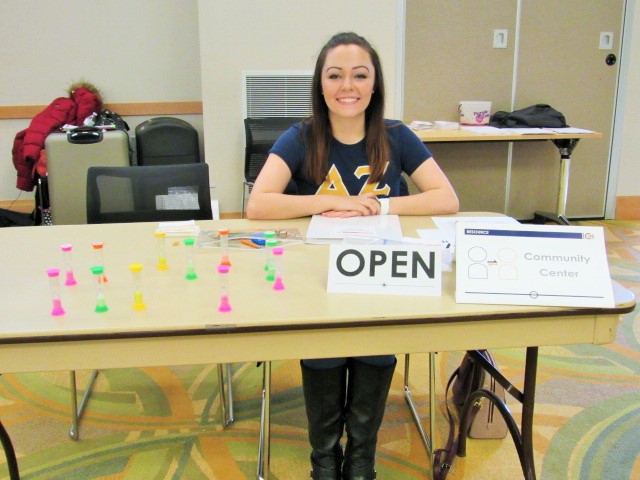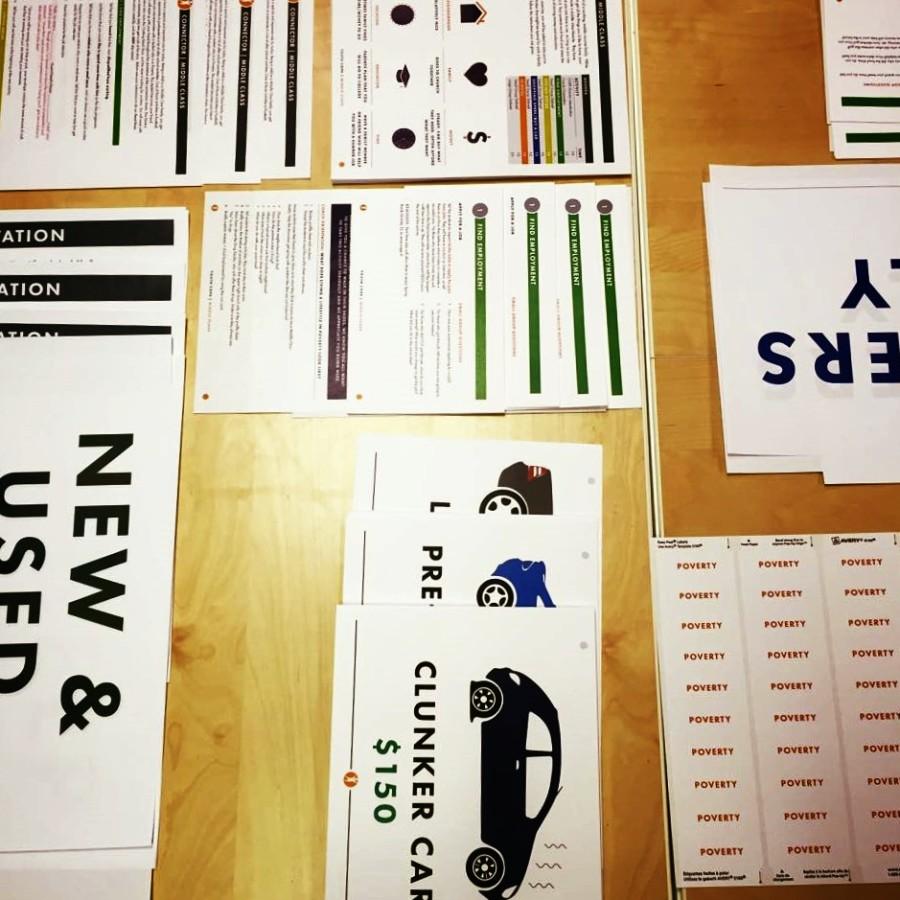Learning how to COPE
Madeline Stine volunteers to work the community center station. Stine predicted Project COPE would be a powerful experience.
“Fiona Reynolds, you’re going to present first, do you have your speech prepared?”
The students turned their heads and shifted their eyes towards Reynolds. She was staring down at her folder on top of her desk. Reynolds remained silent as the professor asked a second time if she was ready.
“Alright, well since you don’t have anything prepared and you’re not sharing, I’ll have to mark you an F on this assignment.”
Project COPE was created for simulations that show faculty and students some of the challenges families and students face when trying to balance their lives with poverty.
The CareSource Foundation has partnered with ThinkTank to develop the Cost of Poverty Experience which was co-designed with low-income individuals who have shared their story so that participants could gain greater understanding.
Madhura Kulkarni, NKU staff member, played the character of Reynolds through the COPE scenarios, which took place on Feb. 19 in the Student Union Ballroom.
“The role-playing was very helpful with understanding how we can improve students’ lives,” Kulkarni said. “It gave me goose bumps. There were so many restrictions on Fiona, because of her job and kids, she just didn’t have enough time to stay on top of her school work and get things done. We can empathize more with our students and give them more resources to lessen their struggles with time and isolation.”
Along with the classrooms, other stations were set up, such as a minimum-wage employer, a financial aid office, a family wellness center, a community center and a supermarket center to show participants the daily struggles and obstacles low-income students face.
Gary Cates, NKU staff member, was running from the classroom to the pawn shop to try and make ends meet. Despite his strongest efforts, Cates still fell short.
“Tony, the student I played, lived on his own, went to school full time and worked two full-time jobs,” Cates said. “At one point, he got evicted and was forced to pawn some of his stuff. Plus, on top of that he was failing one his classes. It was very stressful and I learned poverty has many different hectic parts for college students.”
According to the Federal Poverty Guidelines in 2014, over 58,000 students self-identified as homeless, a 25 percent increase from the previous three years. In 2015, one in four first generation students were living in poverty.
Madeline Stine, junior organizational leadership major, volunteered to work the community center station because she knew that this event would be an eye-opening experience.
“I feel very blessed with everything I have,” Stine said. “To see what other students and people have to go through is heartbreaking. Often times you probably don’t know if the person you’re sitting next to in class is going through this. If someone walks into class late you have a preconceived notion of why or you judge someone based on what they’re wearing. You don’t really understand what they have going on. This gives you more insight and you really see how much they go through.”
At the end of the simulation, Heather Cunningham the director of NKU’s Project COPE and the national trainer for ThinkTank asked the 50 participants how the journey was.
“How many of you paid your bills on time?” Two people raised their hand.
“How many of you made it to your classes on time?” One person raised their hand.
“How many of you did something fun on the weekend?” One person raised their hand.
“How many of you asked for help?” No one raised their hand.
“You can read about stuff in a textbook and hear stories but to actually go through what it’s like to be in poverty, you gain a completely different perspective,” Cunningham said. “Even doing little things, like discussing your experiences and spurring an urgency to get involved helps. We need to reach out to those in need of assistance because they might not ask for help, or nowhere to get it.”
Cunningham hopes to educate the faculty and staff on campus so they have a better understanding and learn to identify with NKU’s students.
According to thinktank-inc.org, COPE has been a very powerful experience for over 3,000 participants in the past two years.
“The overcommitted can miss a few deadlines,” Cunningham said. “Dieters can take a break from their diet. The busy can take a vacation. One cannot take a vacation from poverty.”



